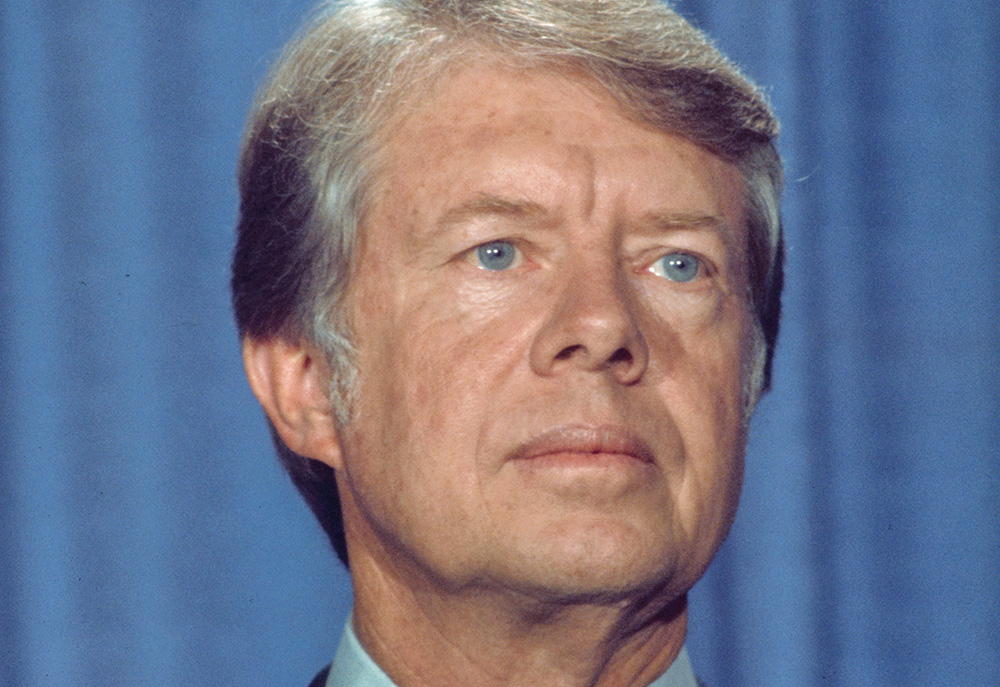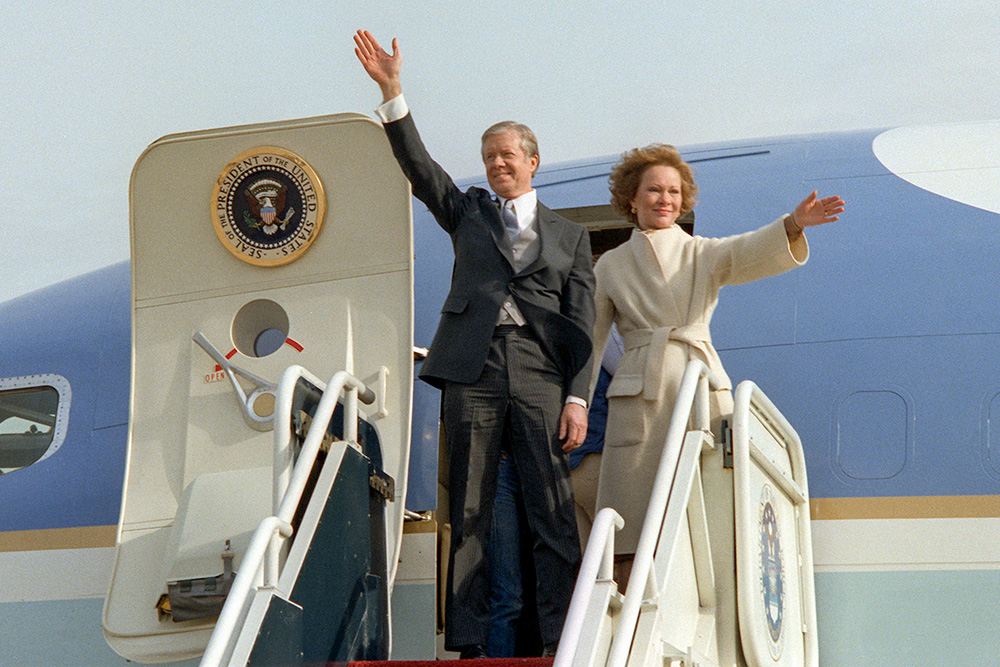
Jimmy Carter in an undated photo taken during his 1977-81 presidency (Library of Congress/Bernard Gotfryd)
Jimmy Carter was the first politician to get me excited about politics. After I watched the congressional Watergate hearings with my mom after school, Carter's promise that he would never lie to the American people seemed like the tonic America needed.
I was 14 when he ran for president in 1976, and I remember convincing my dad that we simply had to take a day off from work and school to go to Hartford when he was holding a rally in advance of the Connecticut primary. The next day, my dad procured a copy of the photo of Carter in front of the Old State House, waving to the crowd and smiling his toothy grin, that ran in the Hartford Courant. That photo is still on the wall of my study.
A group of fellow high school freshmen and I decided to take the bus to Washington, D.C., for Carter's inauguration. We traveled overnight, made our way to the office of Congressman Chris Dodd, who gave us tickets to attend the ceremony. That was the last inaugural ceremony held on the Capitol's East Front. We were pretty far back in the crowd, but it was exciting just to be there.
When I moved to Washington to attend Catholic University in the autumn of 1980, I volunteered to work at his national headquarters on L Street. I was assigned to the group that compiled the many ridiculous things Gov. Ronald Reagan had said through the years. Every once in a while, something our team found would make it into one of Carter's campaign speeches.
On Election Night, I booked a room for myself and some friends in CUA Dems at the Sheraton Wardman Park Hotel where the victory party was to be held. When we arrived and saw some of the more senior campaign aides walking through the lobby with long faces, we knew something was wrong.
We later learned that the campaign's tracking polls, which had the race tied going into the final weekend — 40% for Carter, 40% for Reagan, 10% for independent candidate John Anderson, and 10% undecided — showed that fully half of the undecided voters broke for Reagan on Sunday. The rest followed on Monday. Tuesday, Election Day, was the anniversary of the hostage taking in Iran.
Advertisement
Reagan won with 51% of the vote to Carter's 41%. It was a landslide. Carter conceded the election early in the night and many people had not yet arrived at the hotel. I was standing maybe 20 feet from the president when he said he had called Reagan and congratulated him on his election. I was devastated.
Since Carter died on Dec. 29, 2024, much has been written about him. He was a fine man, the best ex-president we ever had. Some of the government initiatives he undertook, such as fighting corruption and negotiating a peace treaty between Egypt and Israel and bringing a moral compass to the presidency, are rightly celebrated. Boston University Professor Timothy Longman admitted Carter was not a great communicator, but said, "In terms of policy, though, he was ahead of his time."
History has taught me that no one is "ahead of his time," least of all a politician. In politics, especially in a democracy, political leadership consists in the ability to read, shape and lead popular opinion in real time.
Re-read Carter's famous 1979 "malaise" speech. He never mentioned the word "malaise." The president spoke instead about a "crisis of confidence." But the word captured the tone and the delivery. He identified a deep cultural problem but then it was as if his engineering background kicked in.
"All the traditions of our past, all the lessons of our heritage, all the promises of our future point to another path — the path of common purpose and the restoration of American values," Carter said. "That path leads to true freedom for our nation and ourselves. We can take the first steps down that path as we begin to solve our energy problem."
Energy? How do you go from a spiritual crisis to a discourse on oil and gas?

Former President Jimmy Carter and his wife, Rosalynn, wave from the top of the aircraft steps as they depart Andrews Air Force Base at the conclusion of President Ronald Reagan's inauguration ceremony on Jan. 20, 1981. (Wikimedia Commons/U.S. Air Force)
Carter's failure as a politician ushered in the Reagan years. Reagan celebrated self-interest and latched onto an economic policy that set the nation on the road to gross income inequality, enormous corporate power over the lives of working people, and the privatization of public goods. Reagan broke the social stigma against breaking unions. Reagan invaded Grenada — Grenada! — and thought that he had restored American greatness on the world stage. He connected with the simple dreams and earnest patriotism of ordinary Americans, even while he was picking their pockets and trading arms for hostages.
It was easier for Republicans then, as it is easier for Republicans now, to sell their anti-government schtick than it is for anyone, politician or preacher or professor, to reawaken Americans to a sense of national solidarity. Reagan the actor has given way to Trump the professional swindler. Today's GOP is more crude, more violent and more absurd than Reagan's GOP.
There may have been nothing Carter or any other politician could have done to stem the cultural tide that made Reagan a likely, and then an inevitable, success. Reagan was to politics what "Lifestyles of the Rich and Famous" was to television, an invitation to vicarious participation in the nation's good fortune. Carter had no answer except a speech that told us to eat our broccoli.
Jimmy Carter was a good man and a great man. His body was buried yesterday and I am sure his soul has already been welcomed into heaven. His personal qualities, however, didn't translate into political success, and that was the job. Franklin Roosevelt was a master manipulator, more canny than trustworthy, often deceitful, but he led the nation through crises greater than those Carter faced.
Carter's failure may have reflected the failure of the American people. Politics is unforgiving. Nonetheless, his failure to rally the nation opened the door for Reaganism and, just so, everything Carter bemoaned in his "malaise" speech got much, much worse.







